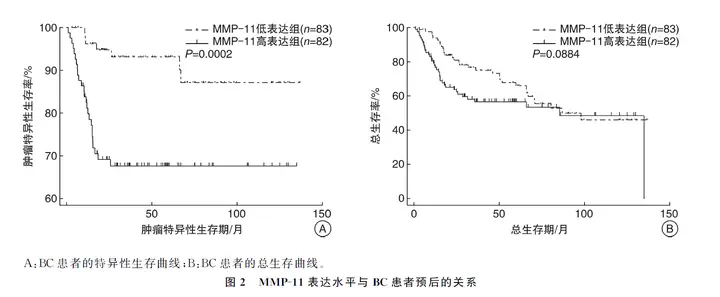 Bladder cancer patient tumor-specific survival curve (left) & Overall Survival Curve (right)
Bladder cancer patient tumor-specific survival curve (left) & Overall Survival Curve (right)Abstract
Objective: Dyslipidemia is a key risk factor for coronary artery disease (CAD). This study aimed to investigate the correlation between the atherogenic index of plasma (AIP) and the severity of CAD.To investigate the clinical relevance of MMP-11 expression in patients with bladder cancer(BC)and the corresponding mechanisms.
Methods: GEO dataset was collected and the corresponding expression profile and clinical information were analyzed.Gene set enrichment analysis(GSEA)was conducted to explore the associated gene sets regulated by MMP-11.
Results: The expression of MMP-11 was upregulated in BC(P =0.008).MMP-11 expression was significantly associated with progression(P=0.026),T stage(P=0.001),N stage(P<0.000 1),grade(P<0.000 1).Higher expression of MMP-11 predicted poor specific survival in BC(P=0.000 2),and higher expression of MMP-11 tended to predict poor overall survival in BC(P=0.088 4).The results of GSEA indicated that MMP-11 regulated gene sets associated with unfolded protein response,spermatogenesis,G2 Mcheckpoint,MYC signaling pathway,E2 Ftargets,mTORC1 signaling pathway,mitotic spindle formation,angiogenesis,glycolysis,cholesterol homeostasis,PI3 K/AKT/mTOR signaling pathway,inflammatory response.
Conclusion: MMP-11 was highly expressed in BC,correlated with worse clinicalpathological features and acted as a prognostic marker and target in the diagnosis and treatment of patients with BC.